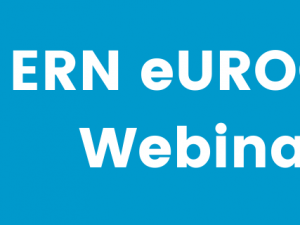
We held our 2nd Annual Strategic Board meeting in Noordwijk from 11-12 June 2018, with 43 attendees representing our Coordinating Team, Operational Board, Workstreams, Health Care Providers (HCPs) and European Patient Advocacy Group (ePAG), as well as the European Association of Urology (EAU) and the European Commission (EC).
The agenda, attendee list, presentations and photos from the meeting can be found in the eUROGEN ECP (eUROGEN > Library > Meetings > 2018)
Christopher Chapple (Coordinator) (UK) welcomed everyone to the meeting and summarised the three-year plan for the ERN, including funding and our work packages (management, dissemination, evaluation, guidelines, diagnosis and expert advice, research, and teaching & training).
Serena Bartezzati (Associazione Italiana Cistite Interstiziale) (IT), Matt Bolz-Johnson (EURORDIS) (BE) and Dalia Aminoff (Associazione Italiana Malformazioni Anorettali) (IT) delivered a report from our ePAG. They explained that ePAGs (comprised of patient organisations within Europe) fit into the ERN programme by representing the wider patient community in terms of the strategic and operational delivery of an ERN. Our ePAG has had numerous achievements over the first year by raising awareness of and promoting eUROGEN, participating in and presenting at eUROGEN, EC and other meetings, and supporting the whole ERN process. They aim to continue and build on these achievements over the next year.
In his presentation, Jochen Hubertus (HCP representative) (DE) showed how important ERNs are for rare diseases, especially when translated into national structures where there is decentralized rather than centralized health care, and noted that in Germany he would be coordinating some CPMS panel case discussions with guest users.
On the second day, the three Workstream Leaders, Wout Feitz (WS1 Lead) (NL), Margit Fisch (WS2 Lead) (DE) and Vijay Sangar (WS3 Lead) (UK) each gave a report on the activities and next steps of their workstreams.
In her presentation on guidelines development, Karin Plass (European Association of Urology, Guidelines Office) (NL) outlined the workings of the EAU’s Guidelines Office and noted that there is some overlap between the rare diseases and conditions covered by eUROGEN and the existing EAU Guidelines. However, she advised that there will be some challenges to overcome to expand these and that a transparent consensus finding process has to be applied in areas where there is very little evidence (high-level or otherwise) to support recommendations.
Jarka Bloemberg (European Association of Urology, Communications Office) (NL) gave an update on eUROGEN’s communication activities including the website, news and publications, social media channels, the e-newsletter, and patient stories. She encouraged our members to share interesting content with us (e.g., press releases, video interviews, and articles), to let us know when they speak at events and send photos from these, and to support us on social media.
Caroline Paquier (EC DG Health and Food Safety, Information Systems) (BE) gave a presentation on the EC’s Information Systems for ERNs, covering the Clinical Patient Management System (CPMS) and its key functionalities and the ERN Collaborative Platform (ECP). Hany Mina (OpenApp) (IE) then demonstrated a live walkthrough of how to enter patient information and hold a panel discussion on CPMS.
Wim Witjes (eUROGEN Lead for Registries and European Association of Urology, Research Office) (NL) gave an update on efforts to set up a rare disease registry for eUROGEN, including lobbying and applying for funds, communicating with software companies, and the recent workshops that he attended in Italy, hosted by the European Joint Research Council. The major objective is to deal with the hugely fragmented rare diseases patient data contained in hundreds of patient registries across Europe. The European Rare Disease Registry Infrastructure (ERDRI) is part of the European Platform on Rare Diseases Registration (EU RD Platform) which is currently being developed by the Joint Research Centre (JRC) in collaboration with the European Commission Department for Health & Food Safety.
Dan Wood (Disease Area Coordinator) (UK) gave a presentation on transitional care which has been highlighted as a priority area by our patient representatives. Dan will be setting up a eUROGEN Working Group on Transition so that we can identify ways to help patients transition from Workstream 1 (pediatric) to Workstream 2 (adult complex uro-recto-genital conditions requiring highly specialised surgery). This will enable eUROGEN to offer the best care to our patients from childhood and throughout their adult life.
Before the meeting closed, Michelle Battye (UK) outlined the important future developments and next steps for eUROGEN. Towards the end of the year there will be a call for new healthcare provider members and affiliated partners for the ERNs, and there are still questions about how to manage this process including checking documents and expertise. Michelle also gave an update on the merged ERN Coordinators and Board of Member States Working Group on setting up a process to monitor and performance manage the ERNs, which is chaired by Prof. Chapple.
Christopher Chapple (UK) thanked everyone for attending and for their efforts on eUROGEN to date. We have made a fantastic start! The 3rd Annual meeting is already being planned to be held in Noordwijk in June 2019. More details will follow.




